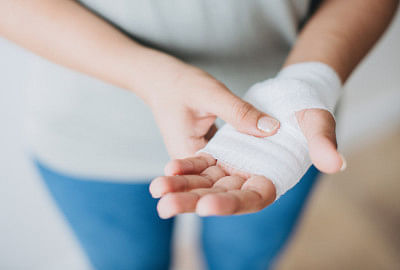
6 Basic First Aid Tips
Anyone can safely treat many minor injuries and ailments with the right techniques and materials. However, it's also crucial to know when someone really needs to visit an emergency room. These first aid tips can help:
1. Put together kits that contain bandages, hand sanitizer, antibiotic ointments, pain medications, gauze pads, tape, tweezers, and similar items. Don't forget to look at the expiration dates from time to time. Many people get cut or burned in kitchens, so place a kit nearby.
2. If someone suffers a sprain, it's best to apply ice for 20 out of every 40 minutes. Elevate the affected body part to promote healing. The person should stop working and rest for a day or longer.
3. Press a gauze pad against a minor wound until bleeding comes to an end. To prevent infection, wash the cut and spread an antibiotic ointment on it. Use a bandage to prevent contamination and protect the tissue from further injury.
4. When an insect stings someone, extract the stinger without squeezing it. Some bugs don't leave stingers behind. Next, clean the skin using soapy water. Ice packs reduce swelling, and hydrocortisone or calamine lotion will minimize discomfort.
5. Pour cold water on a burn right away. Don't put ointments, ice, oils or other substances on the skin. You can apply bandages to minor burns, but avoid making them tight. Forgo unnecessary contact with any blisters.
6. Assemble a list of health-related phone numbers for your local area, and keep it in an easily accessible place. For example, you could look up the nearest urgent care center. Remember to include 800-222-1222; this number puts you in touch with the poison control hotline.
Emergencies
A person ought to visit the nearest emergency room if he or she falls unconscious after a blow to the head, stops breathing, chokes, or suffers a serious electrical shock. Allergic reactions to insect stings also call for swift professional medical treatment.
People should visit emergency rooms when they experience seizures, sudden severe headaches or chest pains, poisoning, or prolonged dizziness. The same goes for severe or large burns. A burn that blackens the skin definitely requires hospital treatment.

